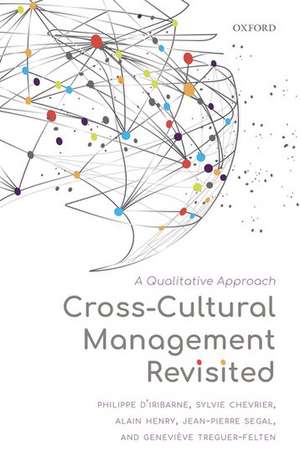Cross-Cultural Management Revisited: A Qualitative Approach
Autor Philippe d'Iribarne, Sylvie Chevrier, Alain Henry, Jean-Pierre Segal, Geneviève Tréguer-Feltenen Limba Engleză Hardback – 15 apr 2020
Preț: 689.37 lei
Preț vechi: 792.68 lei
-13% Nou
Puncte Express: 1034
Preț estimativ în valută:
131.95€ • 143.38$ • 110.91£
131.95€ • 143.38$ • 110.91£
Carte disponibilă
Livrare economică 21-27 martie
Preluare comenzi: 021 569.72.76
Specificații
ISBN-13: 9780198857471
ISBN-10: 0198857470
Pagini: 384
Dimensiuni: 165 x 242 x 25 mm
Greutate: 0.7 kg
Editura: OUP OXFORD
Colecția OUP Oxford
Locul publicării:Oxford, United Kingdom
ISBN-10: 0198857470
Pagini: 384
Dimensiuni: 165 x 242 x 25 mm
Greutate: 0.7 kg
Editura: OUP OXFORD
Colecția OUP Oxford
Locul publicării:Oxford, United Kingdom
Recenzii
This volume from a CNRS-based group offers a thorough, detailed overview of standard managerial practices and how they have been successfully or unsuccessfully implemented in various cultures throughout the world. ... This work illustrates the difficulty of communicating across cultures, not only because of language differences but also because norms governing the use of language differ widely from one culture to another. The text style is dense and may be heavy going for some readers, but the authors offer a plethora of examples drawing from more than 50 different cultural contexts based on 30 years of empirical research.
Having worked in many different places and at various levels of responsibility, but most of the times in environments where cross-cultural management was of the essence, I read with avidityCross Cultural Management Revisited. I have followed the work of Philippe and his team over the years. Rarely have I found it so illuminating combining theory and practice with easiness and integrity and relying on a broad set of examples coming from all continents. Culture is neither an easy excuse for explaining differences nor a nice digest for lectures, but a powerful filter that once understood helps one find the way to get the best out of people and out of an organization. In real life! This is an important and useful work.
This books provides an important trajectory for the understanding of cross-cultural management by offering an analytical perspective that takes the very fluidity, changeability and complexity of cross-cultural encounters seriously. The sensitivity towards the contextuality of interactions manifests through the inclusion of less well explored themes such as the role of the English language and some established themes such as corporate communications, which are revisited from a local cultural perspective. In doing so, the authors offer a fresh and rich picture of what it means to live and manage in a global world.
This well written and engaging book is essential reading for all scholars of cross-cultural management and should be set reading for students of international management. It offers an alternative but necessary approach to the subject and a comprehensive geographic coverage including the often neglected global South. It integrates case studies to illustrate and extract theory about the many facets of managing and organizing across cultures. Importantly, it provides valuable guidelines for conducting interpretative intercultural research from a research team drawing their experience from their extensive research over thirty years. Overall, a very impressive achievement.
Having worked in many different places and at various levels of responsibility, but most of the times in environments where cross-cultural management was of the essence, I read with avidityCross Cultural Management Revisited. I have followed the work of Philippe and his team over the years. Rarely have I found it so illuminating combining theory and practice with easiness and integrity and relying on a broad set of examples coming from all continents. Culture is neither an easy excuse for explaining differences nor a nice digest for lectures, but a powerful filter that once understood helps one find the way to get the best out of people and out of an organization. In real life! This is an important and useful work.
This books provides an important trajectory for the understanding of cross-cultural management by offering an analytical perspective that takes the very fluidity, changeability and complexity of cross-cultural encounters seriously. The sensitivity towards the contextuality of interactions manifests through the inclusion of less well explored themes such as the role of the English language and some established themes such as corporate communications, which are revisited from a local cultural perspective. In doing so, the authors offer a fresh and rich picture of what it means to live and manage in a global world.
This well written and engaging book is essential reading for all scholars of cross-cultural management and should be set reading for students of international management. It offers an alternative but necessary approach to the subject and a comprehensive geographic coverage including the often neglected global South. It integrates case studies to illustrate and extract theory about the many facets of managing and organizing across cultures. Importantly, it provides valuable guidelines for conducting interpretative intercultural research from a research team drawing their experience from their extensive research over thirty years. Overall, a very impressive achievement.
Notă biografică
Philippe d'Iribarne is Managing Director of Gestion et Société (National Cultures & Organisations, www.cerebe.org) at the National Center for Scientific Research (CNRS) in Paris.Jean-Pierre Segal was a member of the National Center for Scientific Research (CNRS) unit Dauphine Recherche Management (DRM) before retiring in November 2018, and remains a supervisor of PhD theses at Paris Dauphine University.Sylvie Chevrier teaches at Université Gustave Eiffel and is former deputy director of the research centre in management of Paris-Est University (IRG).Alain Henry was previously Director of Research at the French Development Agency (AFD), and is currently a member of the research group National Cultures & Organisations (Gestion et Société).Geneviève Tréguer-Felten formerly directed communications departments in MNCs and is currently a member of the research group GEM&L (a language-sensitive research in management association).




















